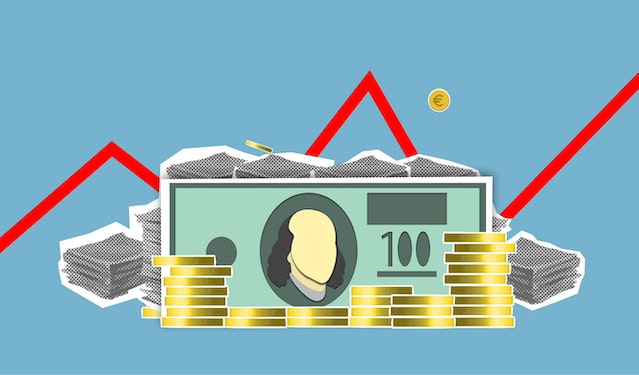For many years, central banks have used the interest rate to control inflation because interest rates and inflation move in the same direction and impact the stock market.
So, when prices of goods and services are rising, central banks resort to slowing down the rate at which the prices increase by raising interest rates. Similarly, when the market money supply is constricted, it reduces the interest rate.
The stock market responds to changes in the interest rate immediately. Typically, the interest rate refers to the rate that the Fed charges banks interested in borrowing from it.
When the FOMC (Federal Open Market Committee) increases the interest rate, it makes borrowing expensive, impacts earnings negatively, and drives the stock prices down.
Thus, during inflationary periods, the money supply is high, so FOMC may choose to use the interest rate as a tool to control it.
Read on to see how manipulating interest rates controls inflation and how interest rates impact stock markets.
How Higher Debt Expenses and Reduced Revenue Impact?
 If a company is less profitable because of higher debt expenses or reduced revenue, it declines its estimated future cash flow. The effect is that it lowers the company’s stock price.
If a company is less profitable because of higher debt expenses or reduced revenue, it declines its estimated future cash flow. The effect is that it lowers the company’s stock price.
Debt expenses include the amount of money the company pays as interest on borrowed loans. The money is surcharged as an expense in the profit and loss account and eats into a company’s profitability.
Normally, the Federal Reserve sets the interest rate it charges banks that borrow directly from it. This rate is always higher than the interbank rate because it is intended to encourage banks to borrow from each other.
So when the Federal Reserve increases the rate, it shrinks the money supply. The action makes borrowing expensive and thus, discourages it.
Conversely, reducing the federal funds rate makes it cheaper for banks to borrow from the central bank. Thus, commercial banks reduce their lending rates to encourage people to borrow. The impact is that it increases the money supply because it makes borrowing cheaper. The action encourages spending on goods and services and even stocks.
The Federal Funds Rate and Commercial Bank’s Interest Rates & their Impact
 The interest rate which banks charge their customers is pegged on the fed funds rate. Also, the federal funds rate forms the basis for credit card annual percentage rate, mortgage loan rate, and other consumer or business loan rates.
The interest rate which banks charge their customers is pegged on the fed funds rate. Also, the federal funds rate forms the basis for credit card annual percentage rate, mortgage loan rate, and other consumer or business loan rates.
Therefore, when the Federal Reserve increases the federal funds rate, short-term borrowing from financial institutions is costly. It reduces the money supply in the market and brings down the inflation rate. Further, a higher interest rate on mortgages and credit cards reduces the amount of money available to the consumer for spending.
Also, high-interest rates increase the bills the consumers must pay. It eats into the household’s disposable income, meaning they have very little money for purchases. They become cautious about the goods and services they buy and reduce aggregate demand. Lack of demand forces producers and manufacturers to adjust the prices down, and eases inflation.
Stock Market and Interest Rate Relationship
 A high-interest rate makes a company less profitable because it greatly eats into its profits. It lowers the company’s stock prices because of two reasons. Firstly, it makes the company look unprofitable and not worth investing in.
A high-interest rate makes a company less profitable because it greatly eats into its profits. It lowers the company’s stock prices because of two reasons. Firstly, it makes the company look unprofitable and not worth investing in.
So, investors will not want to buy its shares. Secondly, a high-interest rate makes borrowing expensive and reduces the amount of money in the hands of investors. Ultimately, it reduces the amount of money they can spend buying stocks. As a result, it reduces the demand for stocks hence lowering the stock prices.
Final Thoughts
From this discussion, it is evident that inflation and stock prices have an inverse relationship. When inflation is high, central banks try to regulate it by increasing interest rates. It makes companies unprofitable and negatively impacts the prices of shares. Also, it reduces disposable income and the amount of money available to invest in shares. You can currently observe this happening in many countries and hopefully, you better understand the context now.


